In today’s digital age, tech companies understand that documentation is necessary for their business and expend significant time and money on its production and maintenance.
As with any technology, choosing the right Content Delivery Solution can be overwhelming. Expectations are higher than ever – customers want a tool that is cost-effective, and seamlessly integrated into their existing IT landscape, with enterprise-grade security and scalability.
Finding a Content Delivery Solution that meets all these criteria is a challenge, but we’ve unraveled the 10 must-have features you need to look into for your next tool.
Here is an overview:
- Out-of-the-box portal
- Autonomous portal configuration
- Integration with any content sources and tools
- Relevant and personalized search
- Offline mode
- Interactivity
- Native mobile experience
- SEO capabilities
- Deep analytics and reporting
- Security and robustness
Out-of-the-box portal
Any company selling software or hardware products will need a documentation portal that will serve its users with the most up-to-date and intuitive content.
Best-in-class Content Delivery Platforms (CDP) must provide an out-of-the-box portal that can be set up with minimal effort to create and deploy engaging content experiences for all types of users.
Check what your CDP’s portal offers by default (i.e. access right management, search capabilities, page reader, multilingual user interfaces,…) and investigate the deployment process: will it take hours, days or months to implement a standard version of your future documentation portal?
Portal configuration
It’s simple, when customers have the freedom and flexibility to configure their product without requiring IT or vendor services, they save time and money. A Content Delivery Platform should allow you to customize the design of your portal to adapt to your branding and create the user experience that aligns with your business. Ask if you can:
- personalize the layout and branding elements
- create as many pages as you need,
- localize your portal,
- make it easily available for mobile
- do it all with an intuitive low-code editor
Make sure you’re in control!
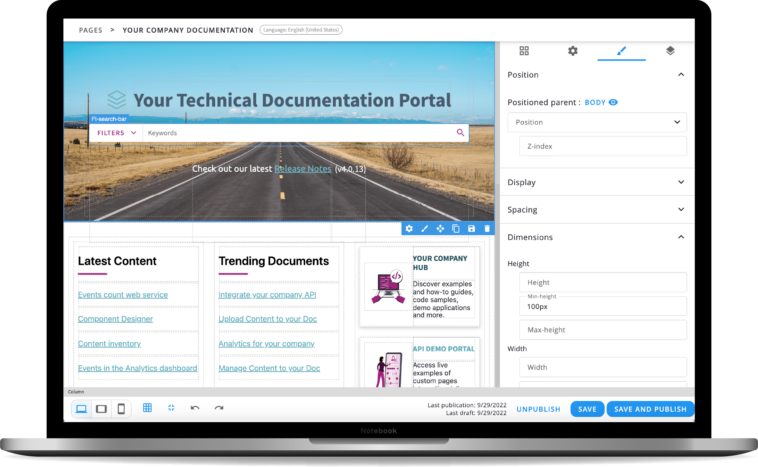
Integration with any content sources and tools
The reality is that today’s product content is authored by many people in many departments using different tools. While documentation teams favor an authoring tool or a CCMS, developers like to write in Markdown and marketers draft Word documents or create brochures in Photoshop.
Find a tool that has ready-to-use integrations and can easily connect to your existing writing systems. Your team will therefore be able to publish their product and technical documentation seamlessly as often as needed and won’t have to worry about content unification and lengthy formatting.

Relevant and personalized search
Web search engines like Google have set high standards for search performance. Modern information search has accustomed us to intuitive access to relevant, up-to-date, and contextual information directly from our most convenient digital channel, app, or tool in use.
A great Content Delivery solution should provide a powerful search engine that enables efficient self-service, customer autonomy and drives product adoption.
The average enterprise search engine is not enough to provide fast answers to users’ complex product questions, so make sure that your CDP’s search engine meets the following requirements :
- leverages powerful linguistic models with proven performance on large documentation corpus
- learns from the user and improves the relevance over time
- contextualizes and personalizes results depending on the situation (i.e. in-product help contextual search)
Offline mode
Your customers and own teams often find themselves in situations and locations without reliable network connectivity. As a result, mobile accessibility is crucial.
Many systems still rely on an internet connection to provide tech docs. To serve field workers effectively, a documentation portal has to offer an offline mode directly on the operator’s device, with a sync capability whenever the network connection is reestablished.
Be sure to consider where your potential users will be during the day. Ask yourself if your users are in a location with limited access to data or Wi-Fi. If this is the case, a CDP ensures your team and customers can service your product under any circumstances and increase uptime.
Interactivity
The right CDP will take you beyond one-way static publication and help you interactively connect with your users.
Get a solution that lets them bookmark preferred sections, share their own knowledge through comments and feedbacks, and build their own dynamic books.
Also make sure you can pick only the functionalities you really need: too many bells and whistles may clutter up your User Experience. Define what makes sense in your situation and to your users.
Native mobile experience
Without the right technology, typical users who work in the field are hampered by inefficiencies. They need an easy-to-use solution that gives them reliable product information readable on any device.
Your solution should take all documentation formats into account: text, 2D, 3D, multimedia, and more. Whether it’s a laptop, a tablet, a smartphone, or AR-VR goggles, your CDP should render these formats perfectly to the technicians’ own devices for clearer instructions and consistently applied procedures.
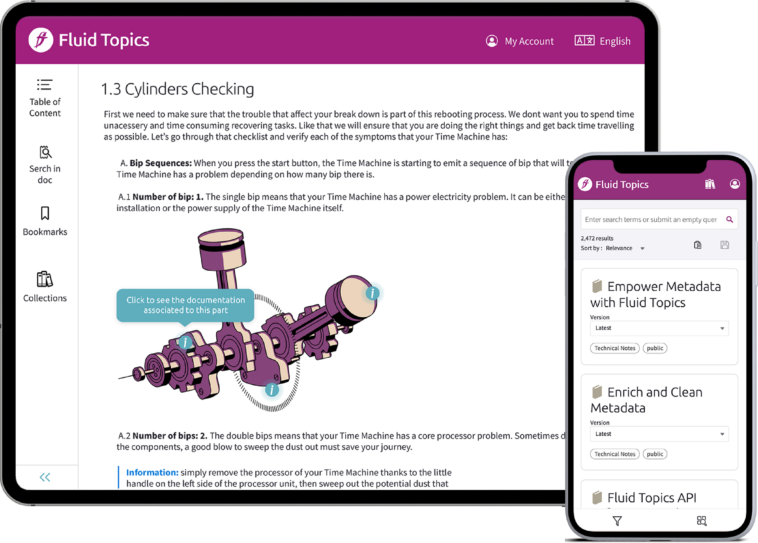
SEO capabilities
Unlike corporate websites, an online documentation portal provides either public information or protected resources. If your content is public, you’ll want to make sure search engines like Google or Bing can find it to generate organic traffic. Ensure your CDP gives you the possibility to activate and customize the way your content is exposed.
Check whether you can:
- Define document titles by adding metadata, such as version or product, in the title
- Generate multiple site maps when you have too many documents
Here is a real-life example. Google regularly crawls the Teradata documentation portal. When searching for « connect to non-Teradata source » on Google, the « Connecting Teradata Advanced SQL Engine from Non-Teradata Sources » Documentation on Teradata’s official portal appears at the top of the list of search results.
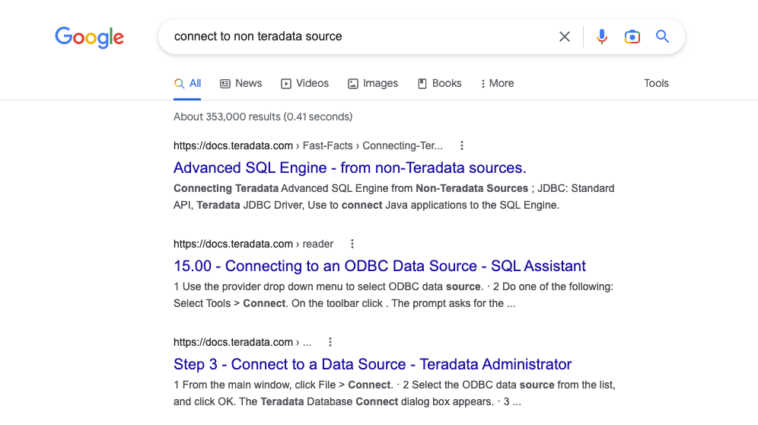
Deep analytics and reporting
It’s no secret that Google Analytics (GA) is the most widely used analytics tool globally. While the metrics provided by GA are great for marketing initiatives, a good CDP can provide richer, more valuable insights into your content’s performance.
Your CDP should provide data such as “Search with no results”, “most and least read topics”, “topics ratings”, and “time spent reading a section” and more, and can be accessed at any time for use by your documentation team. By applying these stats in the right way, you gain a real competitive advantage as the guesswork is removed when it comes to underperformance.
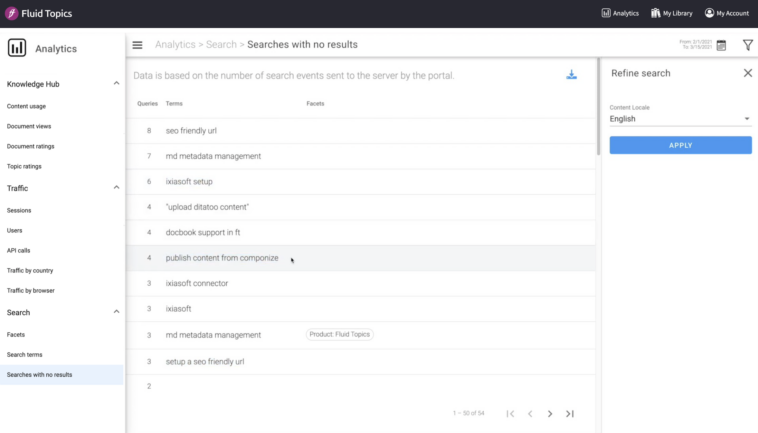
Security and robustness
Data breaches and attack incidents are on the rise. Everything boils down to establishing a robust security system for your customers and for yourself. It’s essential that you choose a reliable Content Delivery Platform that has received the ISO 27001 certification or the SOC 2 certification.
Being ISO 27001 certified for example, is a testament to the fact that the vendor prioritizes data security for its clients, investors, partners and employees and ensures that the software product and its infrastructure are robust. The ISO 27001 certification demonstrates an ongoing and systematic approach to managing and protecting systems and guarantees that the vendor will safeguard confidentiality, accessibility, and integrity of a company’s information.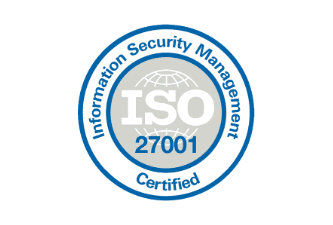
Enhance your technical documentation with Fluid Topics
While you don’t need to try every new feature for your content delivery platform, you should look into the ones that your team and customers have come to expect from your technical documentation portal.
Platforms vary greatly so begin by defining your requirements and then researching well.
Leading tech companies around the world have been building outstanding content experiences with Fluid Topics thanks to these 10 must-have features! If you’re considering moving to a content delivery platform, we hope you found these tips useful!
Feel free to contact us to get your free customized demo!
Latest post




